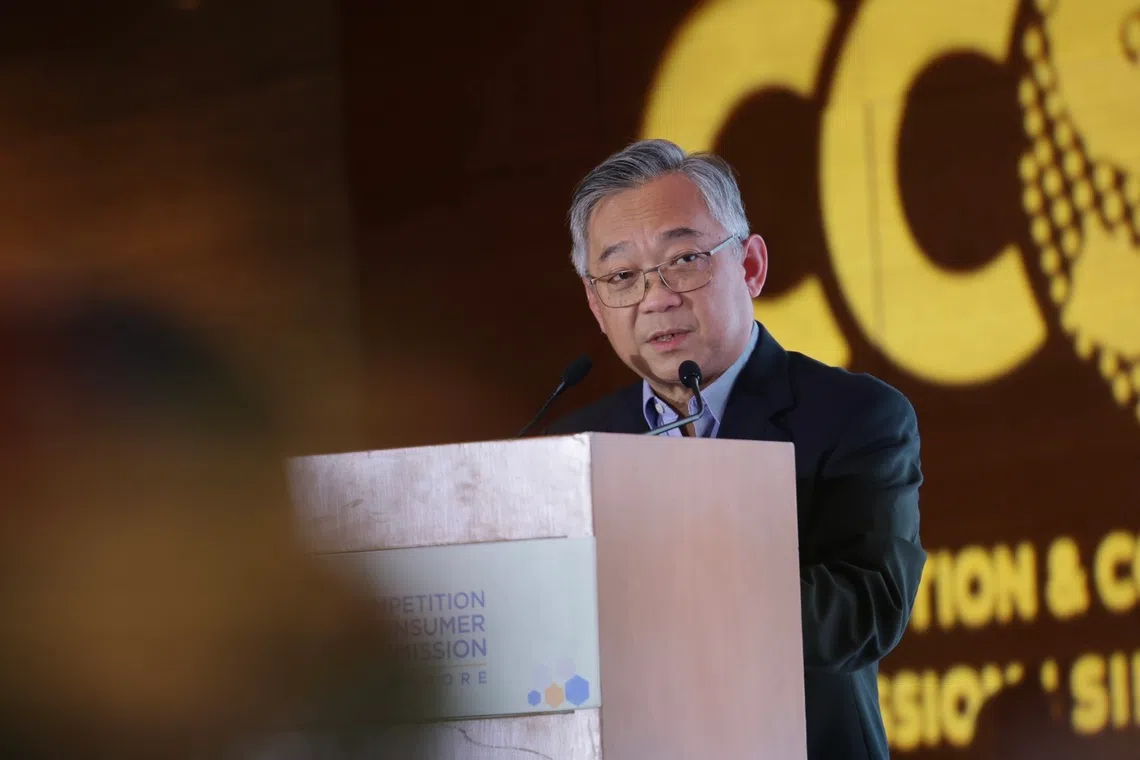Singapore to strengthen e-commerce guidelines to better protect consumers, merchants: DPM Gan
Sign up now: Get ST's newsletters delivered to your inbox

DPM Gan Kim Yong speaking at the Competition and Consumer Commission of Singapore’s 20th anniversary dinner on Sept 25.
ST PHOTO: GIN TAY
- Singapore introduces new e-commerce standards to combat online scams and protect consumers and merchants from unfair practices.
- The enhanced settlement framework incentivises faster resolution of business mergers that may infringe the Competition Act, reducing costs for businesses.
- CCS is working with Asean counterparts to promote consistent competition laws and reduce barriers for businesses operating across the region.
AI generated
SINGAPORE – Singapore is introducing new e-commerce standards to enhance protection for both consumers and merchants, as online scams continue to rise.
The new standards will guide businesses on how they can address customers’ concerns such as fake reviews and misleading headlines and product descriptions, among other things.
They will also guide e-marketplaces and e-retailers on how to engage with merchants fairly and transparently, and the appropriate use of automated tools and artificial intelligence on their platforms.
Deputy Prime Minister Gan Kim Yong unveiled the measures at the Competition and Consumer Commission of Singapore’s (CCS) 20th anniversary dinner, held at the Grand Hyatt Singapore on Sept 25.
The competition watchdog, previously known as CCCS, announced its rebranding at the event.
It is a government body established in 2005 under the Ministry of Trade and Industry to ensure fair competition and strengthen Singapore’s competitiveness.
On the new e-commerce standards, DPM Gan, who is also the Minister for Trade and Industry, said that current national guidelines will be reinforced to meet the new market demands brought about by technological developments.
Online scams have become a growing concern, as consumers can be misled by fake reviews, hidden charges, as well as design features and algorithms that may steer them to make certain choices unknowingly, he said.
Merchants also can face unfair practices from large platforms, where the balance is tilted heavily against them.
The current national guidelines for e-commerce were first introduced in 2020. They were revised in 2022 to include anti-scam guidelines for e-retailers and e-commerce marketplaces.
There were 3,237 cases of e-commerce scams in the first half of 2025, with losses amounting to more than $7 million, according to police statistics.
DPM Gan added that businesses will soon receive more guidance on making accurate and substantiated claims on the qualities, uses and benefits of their products, including green claims.
At the event, he also announced an enhanced settlement framework, which will be rolled out by CCS after public consultation.
This framework will incentivise faster case resolution on business mergers that may infringe the Competition Act and raise competition concerns, by reducing legal and administrative costs for businesses.
This creates greater certainty that will benefit markets and consumers, DPM Gan said.
CCS would also be able to dedicate its resources to focus on more complex matters, and target its regulatory efforts more effectively, reducing the compliance burden on businesses.
The statutory board has reviewed over 100 business merger notifications under its voluntary notification scheme since 2007, with 80 per cent of these cleared without conditions.
While it is the responsibility of merger parties to ensure that they do not infringe the Competition Act, CCS can investigate mergers of its own accord and has the authority to order the merger to be dissolved or modified, and even impose financial penalties.
The watchdog’s chairman Max Loh cited Grab’s proposed acquisition of taxi company Trans-cab as one of its notable regulatory cases. The ride-hailing platform abandoned its proposal in July 2024 after the competition watchdog ruled that the deal would flout antitrust laws.
“This demonstrates our commitment and ability to keep markets in Singapore open and contestable,” Mr Loh said.
He added that competition on merit has driven innovation among businesses, leading to a wider variety of choices and lower prices for consumers.
DPM Gan noted that CCS’ role has evolved and expanded over the years, and these changes reinforce the importance of competition law and consumer protection for Singapore’s markets while strengthening its global competitiveness.
He cited clear rules, fair enforcement and well-functioning markets as key pillars of Singapore’s economic success and resilience.
The statutory board is working with other Asean counterparts to build capacity and promote greater consistency in competition laws, reducing barriers for businesses that operate across the region and complementing Singapore’s efforts to deepen trade within the region.
It is also active in the International Competition Network, where CCS chief executive Alvin Koh is serving as the vice-chairman, DPM Gan said.



